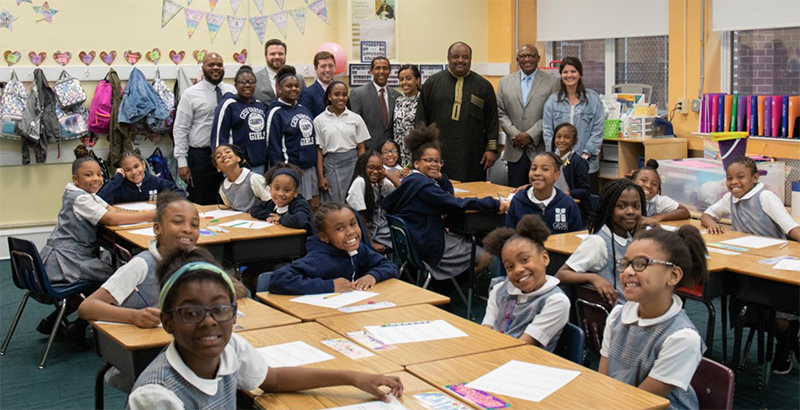McAllister: Is School Choice the Black Choice? It Must Be, to Aid the Cause of Equality

This column originally appeared at ThePhiladelphiaCitizen.org.
Many parents have challenges trying to get their kids to do what’s best for them so they can be as strong as possible.
I don’t with Nolen McAllister — not when it comes to him eating oatmeal, anyway.
This kid eats it at least twice daily. Sometimes, he’ll eat it before he goes to bed or even as a snack.
That’s great. Now, if I can only get him to eat his vegetables with the same vigor.
As I tell him while putting broccoli on his plate: “Son, it’s great that you enjoy one thing that’s good for you, but relying too much on one thing and not having enough of others won’t allow you to be as strong as possible.”
When it comes to feeding our children’s minds, we must take the same approach. Relying too much on one approach to education without leveraging all possible good options for schools will not allow our children to be as prepared as possible for the future. As a result, our communities won’t be as strong as possible.
That’s why we need school choice.
And let’s be clear: School choice, for our communities, is not anti-public schools. It’s pro-children, pro-education and pro-advancement.
And, to be further clear — based on where things are for black folks concerning disparities in net worth, graduation rates from high school and college, and treatment within the job market and the need for us to reverse these trends — leveraging the best available education options for our children is also pro-black.
We must consider — if not embrace — school choice. We don’t have the option to cast aside any viable education opportunities if we seek to secure economic, employment and civil rights equality in America.
Many Americans remember that the fight for African Americans was to find inclusion into tax-funded public schools. At the time, most of these schools were the better option between “white schools” and “Negro schools” that were intentionally devoid of proper resources by Jim Crow administrators. Local leaders used Plessy v. Ferguson (1896) to maintain inferior schools for years — basically doing what was legal without doing what was right.
Civil rights activists led a charge to correct this wrong, not only in elementary education in places such as Charlotte and Little Rock, but also in places of higher education, including Ole Miss and the University of Alabama. Yet the fight for equality in education was never just for inclusion into the best public schools. Just look into the challenges facing those breaking down racial barriers at Davidson College during the civil rights era or, closer to Philadelphia, Princeton University.
The civil rights fight has always been for access to quality education and opportunities — wherever they can be found. In this diverse world where endless opportunities are found throughout the nation’s and world’s economies, we have an obligation to pursue every feasible path toward inclusion.
Access to business leadership — jobs that African Americans are woefully underrepresented in, both in corporate leadership roles and in corporate boardrooms — comes through the educational experiences and alumni networks of a wide range of schools: public, private, parochial, charter and cyber. To improve the employment conditions in our communities (where black unemployment remains twice the level of whites’), we must achieve more academic success and have more of a presence in positions of decision-making. School choice helps that.
Access to capital — by way of educating more black economists to foster wealth within our communities as well as eliminating the stubborn deficit black families have concerning net worth compared to other Americans — comes when our children make their collective mark in the best schools, colleges and businesses, whether they are historically black colleges and universities such as Howard’s award-winning economics program or others such as Penn. School choice helps this pursuit.
The same could be said with fostering more black doctors, more black teachers and more black journalists, among other professions. School choice helps this.
The simple truth is: As we are beating back the resegregation of America while we compete against the world in a global economy, we cannot afford to exclusively count on an education system that treats more of our children’s schools like jails and where our children attend more segregated schools with inherent poverty and deficient resources. We cannot afford to wait until decades-long problems of funding formulas, mismatched teacher/student dynamics and deficiencies in math and reading scores are fixed before our children can be prepared for the future.
Yes, we must improve public education. At the same time, we must make sure that our children access quality education now.
For us to have a future, we must have a choice. It’s the only way for our communities to be as strong as possible.
Lenny McAllister is director of Western Pennsylvania for the Commonwealth Foundation. He was a panelist for the May 29 “Is School Choice the Black Choice?” event presented by The 74 and journalist Roland Martin in Philadelphia.
Get stories like these delivered straight to your inbox. Sign up for The 74 Newsletter

;)